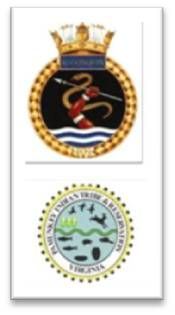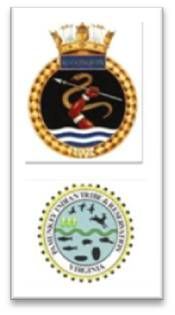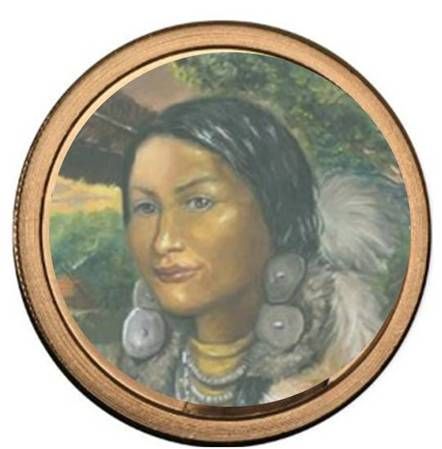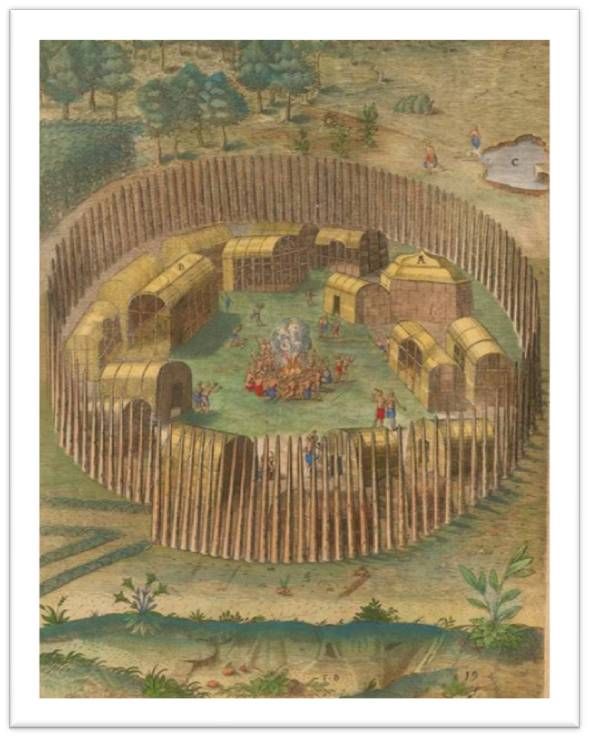Gate's plan was for Chief Powhatan to give more land for the colonist and release the prisoners in exchange for "Pocahontas". During the negotiations Gate's proposed and arranged marriage between himself and "Cleopatra". Powhatan's response to his proposal was to give Matachanna to his cousin Opechancanough Mangopeesomon Powhatan in an arranged marriage. Opechancanough and Matachanna were married at Werowocomoco in early 1614. "Pocahontas" was held hostage on the ship George during the continued negotiations. On 15 Apr 1614 "Pocahontas" voluntarily married John Rolfe, to join the Powhatan Confederacy and the British together. Her efforts were successful, the Powhatans and British Colonist lived in peace for a time. Matachanna and Opechancanough's twins, son Nectowance daughter Chalakatha "Pride" Powhatan were born in Feb 1615 in Werowocomoco Indian Territory. In early spring of 1616 The Virginia Company determined they needed more money to support Jamestown. They directed the current Governor of Jamestown, Sir Thomas Dale to bring John Rolfe and his family to England. Their plan was to hold a Lottery to have the opportunity of the English to meet a real "Indian". Powhatan negotiated with Thomas Dale to allow the couple to have a twelve member security and support group to travel to England as escorts and protectors for "Pocahontas" and her family. He appointed his nephew Tomocomo Pamunkey as his Representative in any negotiations and decisions regarding the relationships with the English. His daughter Matachanna was charged with the physical protection and supporter of her sister. She left her children in the care of her husband as she traveled to England. John Smith sent a letter to Matachanna and "Pocahontas" thru Queen Anne requesting an audience. The "Princesses" refused. Their interactions with him in the Colony had made them aware of his duplicity. They had seen his "History" of life in the Colony. Read his arrogant version of his accomplishments in outwitting the Powhatan. The fabrication he had written in his descriptions of the attire or "lack of" and sexual behavior of the people of the Confederacy. They had seen the fraudulent drawings he had commissioned depicting their father and immediate family as savages. They sent a powerfully worded refusal to his request. On 18 Mar 1617 the Ship George left the dock at London sailing up the Thames Estuary bound for the Plymouth Port. At the assistance of "Pocahontas" the ship was well stocked with the English Tea she had become so addicted to. She insisted on having a cup of tea to settle her so she could sleep. Before the ship reached Gravesend in Kent, she fell ill and died. atachanna had the grave task of traveling to Werowocomoco to tell her father of "Pocahontas" death. She described the suspicion that she was murdered by the English by poison in her tea, and the decision to leave his grandson Thomas with his uncle in England for his safety. Wahunsunacawh Powhatan died from smallpox 01 Apr 1618 in Pamunkey River Indian Territory. The leaders of the Confederacy elected his cousin Opichapam Powhatan, Chief of the Powhatan Confederacy 04 Apr 1618. Opichapam Powhatan was the older brother of Matachanna' husband Opechancanough. When Governor Thomas Gates, in Jamestown, learned of Wahunsunacawh's death he ordered his mercenaries to resume their attacks on the outlying villages with the goal of destroying the "natives" and claiming the lands for England. Opichapam, Chief Powhatan, intensified the attacks on Jamestown and surrounding British settlements. War was once again the way of life. Matachanna lived in Werowocomoco with her husband Opechancanough and their children. The British had set their sights west of James Fort not venturing north. For two years Matachanna and Opechancanough lived a peaceful life, he took no active interest in the "cat and mouse" with the British, minor skirmishes one day, bringing food and supplies the next. Tensions reached an all time high between the British and the Powhatan in late spring of 1620. Like Wahunsunacawh, Opichapam believed that the British "Company" was the Matwau "enemy "of the Powhatan. He considered the colonist that simply wanted to make a home for their families in this "new world" as friends. He continued to honor the Peace Treaty that had been in place for six years. Opichapam was murdered in the summer of 1620. Opechancanough was elected Chief Powhatan by the leaders of the Confederacy. No matter how much Matachanna tried to reinforce the belief that "not all British were evil, just as all Powhatans were not savages", he could not see beyond the murder of his older brother and the slaughter of the women and children in the villages. He was biding his time, and gathering his forces for what was to be a fatal blow to the British and their elimination from his homeland. On 22 Mar 1622 he began what is known historically the Jamestown Massacre. Matachanna's brother Mantaquaus Powhatan was killed in the battle. Opechancanough never returned to Werowocomoco, he did not want to bring the British to the village where his wife and children lived. He released his wife Matachanna from their marriage bond and never returned to the capital. He and his warriors lived on the run from the British hiding in the woods and caves of the area, attacking the British randomly. Matachanna married Opechan Stream Cornstalk, Chief of the Pamunkey Tribe 1624 in Werowocomoco. Opechan was the son of Running Stream Cornstalk and Pauwiske Morning Scent Flower. He was born 1570 in Werowocomoco, Orapax Indian Territory. Matachanna and Opechan lived in relative peace and security in Werowocomoco. Opechan accepted Chalakatha and Nectowance raising them as if they were his own. The couple had three children born there. Their oldest son Hokolesqua Opecham Stream Cornstalk was born in 1625. Their daughter Nicketti was born in 1628. Their youngest son Tottopottomoy Cornstalk was born in 1635. In early 1636 Chalakatha was given to Thomas Pasmere Carpenter, a young British soldier; by her parents Opechancanough and Matachanna. The marriage ceremony was conducted by her stepfather, Opechan, at Werowocomoco. Thomas aligned himself with the Pamunkey. When Nectowance turned 16 in the spring of 1636, he joined Opechancanough in the war against the British In 1641 Thomas Rolfe returned to Virginia to claim his father's property and his inheritance from his grandfather Wahunsunacawh. Where there were no issues preventing his claim to his father's plantation, Varina Thomas had to meet with his Uncle Opechankeno and Aunt Matachanna to claim his inheritance from his grandfather. The rules of the Colony at that time prohibited communication between individuals and the Powhatan people unless approved by the Governor. Thomas sent the following request to Governor William Berkley. "Dec 17th, 1641—Thomas Rolfe petitions the governor to let him see Opechankeno to whom he is allied and Cleopatra, his mother's sister" There is no written documentation of the permission; however it is known that Thomas did later claim 200 acres of property to expand his plantation. When this transaction was complete Thomas cut his ties with his Powhatan relatives and enlisted in the British Army. On the first day of April 1644 Opechan and Matachanna, gave their daughter, "Tahnee" princess Nicketti Cornstalk to John in a marriage ceremony at Werowocomoco, Orapax Indian Territory. When Governor John Harvey learned of the marriage, he "labeled" John as a traitor. In his anger he ordered a raid on Werowocomoco in retaliation. Just days after the wedding the British soldiers invaded Werowocomoco, killing 44 and injuring many more. Among the dead were Matachanna and Opechan and her Cousin Chief Tomocomo Pamunkey and his wife Nonoma Apachano.
Gate's plan was for Chief Powhatan to give more land for the colonist and release the prisoners in exchange for "Pocahontas". During the negotiations Gate's proposed and arranged marriage between himself and "Cleopatra". Powhatan's response to his proposal was to give Matachanna to his cousin Opechancanough Mangopeesomon Powhatan in an arranged marriage. Opechancanough and Matachanna were married at Werowocomoco in early 1614. "Pocahontas" was held hostage on the ship George during the continued negotiations. On 15 Apr 1614 "Pocahontas" voluntarily married John Rolfe, to join the Powhatan Confederacy and the British together. Her efforts were successful, the Powhatans and British Colonist lived in peace for a time. Matachanna and Opechancanough's twins, son Nectowance daughter Chalakatha "Pride" Powhatan were born in Feb 1615 in Werowocomoco Indian Territory. In early spring of 1616 The Virginia Company determined they needed more money to support Jamestown. They directed the current Governor of Jamestown, Sir Thomas Dale to bring John Rolfe and his family to England. Their plan was to hold a Lottery to have the opportunity of the English to meet a real "Indian". Powhatan negotiated with Thomas Dale to allow the couple to have a twelve member security and support group to travel to England as escorts and protectors for "Pocahontas" and her family. He appointed his nephew Tomocomo Pamunkey as his Representative in any negotiations and decisions regarding the relationships with the English. His daughter Matachanna was charged with the physical protection and supporter of her sister. She left her children in the care of her husband as she traveled to England. John Smith sent a letter to Matachanna and "Pocahontas" thru Queen Anne requesting an audience. The "Princesses" refused. Their interactions with him in the Colony had made them aware of his duplicity. They had seen his "History" of life in the Colony. Read his arrogant version of his accomplishments in outwitting the Powhatan. The fabrication he had written in his descriptions of the attire or "lack of" and sexual behavior of the people of the Confederacy. They had seen the fraudulent drawings he had commissioned depicting their father and immediate family as savages. They sent a powerfully worded refusal to his request. On 18 Mar 1617 the Ship George left the dock at London sailing up the Thames Estuary bound for the Plymouth Port. At the assistance of "Pocahontas" the ship was well stocked with the English Tea she had become so addicted to. She insisted on having a cup of tea to settle her so she could sleep. Before the ship reached Gravesend in Kent, she fell ill and died. atachanna had the grave task of traveling to Werowocomoco to tell her father of "Pocahontas" death. She described the suspicion that she was murdered by the English by poison in her tea, and the decision to leave his grandson Thomas with his uncle in England for his safety. Wahunsunacawh Powhatan died from smallpox 01 Apr 1618 in Pamunkey River Indian Territory. The leaders of the Confederacy elected his cousin Opichapam Powhatan, Chief of the Powhatan Confederacy 04 Apr 1618. Opichapam Powhatan was the older brother of Matachanna' husband Opechancanough. When Governor Thomas Gates, in Jamestown, learned of Wahunsunacawh's death he ordered his mercenaries to resume their attacks on the outlying villages with the goal of destroying the "natives" and claiming the lands for England. Opichapam, Chief Powhatan, intensified the attacks on Jamestown and surrounding British settlements. War was once again the way of life. Matachanna lived in Werowocomoco with her husband Opechancanough and their children. The British had set their sights west of James Fort not venturing north. For two years Matachanna and Opechancanough lived a peaceful life, he took no active interest in the "cat and mouse" with the British, minor skirmishes one day, bringing food and supplies the next. Tensions reached an all time high between the British and the Powhatan in late spring of 1620. Like Wahunsunacawh, Opichapam believed that the British "Company" was the Matwau "enemy "of the Powhatan. He considered the colonist that simply wanted to make a home for their families in this "new world" as friends. He continued to honor the Peace Treaty that had been in place for six years. Opichapam was murdered in the summer of 1620. Opechancanough was elected Chief Powhatan by the leaders of the Confederacy. No matter how much Matachanna tried to reinforce the belief that "not all British were evil, just as all Powhatans were not savages", he could not see beyond the murder of his older brother and the slaughter of the women and children in the villages. He was biding his time, and gathering his forces for what was to be a fatal blow to the British and their elimination from his homeland. On 22 Mar 1622 he began what is known historically the Jamestown Massacre. Matachanna's brother Mantaquaus Powhatan was killed in the battle. Opechancanough never returned to Werowocomoco, he did not want to bring the British to the village where his wife and children lived. He released his wife Matachanna from their marriage bond and never returned to the capital. He and his warriors lived on the run from the British hiding in the woods and caves of the area, attacking the British randomly. Matachanna married Opechan Stream Cornstalk, Chief of the Pamunkey Tribe 1624 in Werowocomoco. Opechan was the son of Running Stream Cornstalk and Pauwiske Morning Scent Flower. He was born 1570 in Werowocomoco, Orapax Indian Territory. Matachanna and Opechan lived in relative peace and security in Werowocomoco. Opechan accepted Chalakatha and Nectowance raising them as if they were his own. The couple had three children born there. Their oldest son Hokolesqua Opecham Stream Cornstalk was born in 1625. Their daughter Nicketti was born in 1628. Their youngest son Tottopottomoy Cornstalk was born in 1635. In early 1636 Chalakatha was given to Thomas Pasmere Carpenter, a young British soldier; by her parents Opechancanough and Matachanna. The marriage ceremony was conducted by her stepfather, Opechan, at Werowocomoco. Thomas aligned himself with the Pamunkey. When Nectowance turned 16 in the spring of 1636, he joined Opechancanough in the war against the British In 1641 Thomas Rolfe returned to Virginia to claim his father's property and his inheritance from his grandfather Wahunsunacawh. Where there were no issues preventing his claim to his father's plantation, Varina Thomas had to meet with his Uncle Opechankeno and Aunt Matachanna to claim his inheritance from his grandfather. The rules of the Colony at that time prohibited communication between individuals and the Powhatan people unless approved by the Governor. Thomas sent the following request to Governor William Berkley. "Dec 17th, 1641—Thomas Rolfe petitions the governor to let him see Opechankeno to whom he is allied and Cleopatra, his mother's sister" There is no written documentation of the permission; however it is known that Thomas did later claim 200 acres of property to expand his plantation. When this transaction was complete Thomas cut his ties with his Powhatan relatives and enlisted in the British Army. On the first day of April 1644 Opechan and Matachanna, gave their daughter, "Tahnee" princess Nicketti Cornstalk to John in a marriage ceremony at Werowocomoco, Orapax Indian Territory. When Governor John Harvey learned of the marriage, he "labeled" John as a traitor. In his anger he ordered a raid on Werowocomoco in retaliation. Just days after the wedding the British soldiers invaded Werowocomoco, killing 44 and injuring many more. Among the dead were Matachanna and Opechan and her Cousin Chief Tomocomo Pamunkey and his wife Nonoma Apachano.
Family Members
Advertisement
Explore more
Sponsored by Ancestry
Advertisement









